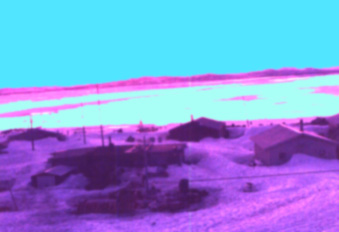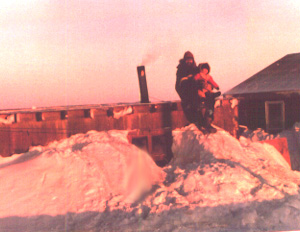
True North has always called me. As though in utero my umbilical cord unwrapped itself from Polaris's navel and has been trying to reconnect ever since. When I was twenty-seven, my husband and I packed our Volkswagon and drove six thousand miles to Fairbanks, Alaska, where we boarded a jet and flew to Kotzebue, and then finally a mail plane to the tiny village of Kivalina. With the amazing luck of cheechakos (new northern residents), we found work in an Inuit village on the Chukchi Sea, just a hop, skip, and glide away from Siberia. In the shrivelled hours of daylight between the Thanksgiving Feast and the Christmas Eskimo Games, we watched the waves begin to slow, the sea to steep into a new blackness, to finally freeze. My Inuit neighbors taught me to never trust the sea ice because treacherous currents rampaged beneath it; or as an old Inuit hunter once warned anthropologist Richard Nelson, "The ice is like a mean dog. He waits for you to stop watching and then he tries to get you." One Sunday in January, when the Arctic light had begun to return again, I decided to test the sea ice with a short walk. My idea was to venture out--cautiously--a few hundred yards. To take a picture of Kivalina from the sea, a trophy view for the folks at home. But once I started walking, the ice seemed so stable that I decided to keep going. No cloud marred the surface of the sky, Behind me nineteen village houses stared out at me. That year my Inuit friend Donald often repeated to me, "The houses have eyes."What he meant was, that no one in the village can go anywhere without others noticing. For once, this thought appealed to me. Since we'd arrived in Kivalina in September, a small circle of tundra marked my entire world. I hadn't walked more than a few miles in any direction; and west, toward Siberia had always been closed to me. Now the wild, roaming sea had been stilled and I could head West, toward Asia. Immediately, upon setting off, I sensed that I'd begun a new journey. A journey away from the safe, the familiar. So alien was it, so different from ordinary walking, that it reminded me of a space walk but without any changes in gravity. The relatively flat, land-locked ice which abutted the village grew more convoluted and wild. Five minutes out, I felt as though I'd entered an immense sculpture garden. Gargoyles of all shapes and sizes glimmered in the Arctic light. Currents and winds had erupted huge ridges on the surface of the ice. My eyelashes caked over with rime. Several times, I had to reposition my scarf, to move the scratchy, frozen breath away from my mouth. Totally surrounded by ice-gargoyles, a paralyzing fear suddenly hit me. Polar bear. I soon convinced myself, that behind every ice sculpture, a huge bear waited ready to imbibe me for its next meal. The way grew more rough. I had to climb jagged ridges on my hands and knees, pull myself over boulders which jutted at weird angles into each other. Would I ever find my way home again? A ridge, with gigantic ice blocks dangling from it, rose forty feet up. Even though I knew I should turn back, this mysterious, uncharted winter-land called out to me. I searched for a pass through the ridge. Curiosity and the knowledge that I would never return here, made me foolhardy. I hiked on. But a series of sharp sounds grounded me. The explosive whack, whack of gunfire. I curled into myself. Were Inuit hunters shooting nearby? The sounds exploded again. This time directly beneath me. A pencil-thin series of cracks shot across the ice. I stopped. The fierce thrumming of the sea's waves thundered inside me. The ice remained in one piece; but these cracks reminded me that the ice was only temporary, and subjected to laws of physics which I barely understood. I decided to turn back, to not risk an unplanned trip to Baffin Island. But a quarter mile off, I noticed a haze of black smoke. Magical. Were the Inuit burning something on the sea? Had some warm current flowed this far North? Or was smoke from Hades calling me near? Being a serious gambler, not with money but with life, I continued. How could I not view this misty magical place, almost within reach? I hurried over to it. With a startling abruptness, the ice ended. A tranquil, ebony lake rippled before me. A sea oasis. Gulls, and other birds flew above its steamy mist. Seals swam in its smoky waters. Had I stumbled into a tropical paradise? Later, I learned that I had reached a polynya, an area of open water, which according to polar explorer, Helen Thayer," because of currents and winds, stays ice free all year, and provides a haven for over-wintering animals." Luck blessed my return. I didn't get lost. No polar bears stalked me. And though several times new explosive cracks jolted me into a fresh state of fear, the winter's walkable floor held firm. As I trudged back, I realized what an extraordinary chance I'd taken, but then I remembered that the villagers had seen me leave--had observed my jaunt across the sea ice. Surely, if I hadn't returned, they would have sent a search party out to rescue me. What did I feel roaming the sea ice that Sunday? A feeling of absolute solitude in that unpeopled landscape. A sense of awe at the incredible beauty of those shimmering ridges and hills. What did I learn? That even though you walk away from your world, you must return, with a hint of frost-burn on your cheeks, the memory of the sea carved into mountains. Also, that solitude, especially Arctic solitude, has its price. That no sound is more frightening than ice cracking, breaking free. That day I experienced a magnetic pull onward; a dangerous drive to walk beyond all bounds of safety. Ironically, a sense of danger made me feel free, able to control my own destiny. Finally--and this is what kept me walking that day--I felt a sense of true enchantment. Enchantment and curiosity in a newly-discovered world. This is the woman I was back then: courageous, foolhardy, adventurous, lacking all common sense; a woman who wanted to braille the far-flung edges of her world. A wanderer, a seeker, an ambulatory decoder who attempted to unlock the code of an encrypted sea. After I returned home, none of the Inuit ever mentioned my walk on the sea-ice. Had no one witnessed my foolish trek on the sea ice? Had I been truly alone on the Chukchi that day? Had I strolled onto the sea ice without any extra clothes, water, matches, or food? How brazen I'd been. Goethe called architecture frozen music. But walking the sea ice that day, I knew Goethe to be only partially right. Those glimmering sculptures, those sun-struck ridges, those translucent ice mountains formed out of the frozen heft and breath of the sea, really captured the music of the universe. That day, the fierce currents of this Northern sea, its choppy, storm-driven waves, had been magically stilled; and I alone experienced their immense beauty. 
© 2008, Dory Lynch, all rights reserved |